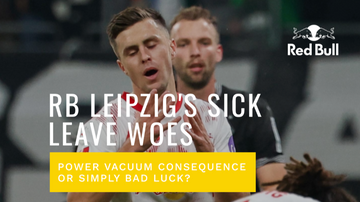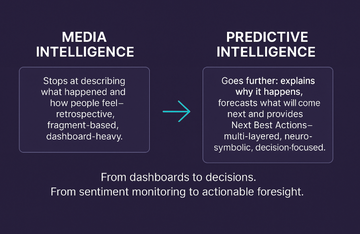RB Leipzig’s Rising Sick Leaves: Coincidence or Symptom of a Power Vacuum?
by Uwe Seebacher on Nov 10, 2024

In a recent interview, RB Leipzig’s coach Marco Rose struck a confident tone, refusing to label his team’s recent performance a crisis despite going winless in three consecutive matches. Rose acknowledged that his players had been “stuck in their heads,” as he put it, describing their mental state as having “a bit of a brain fog” in the last few games. Still, after the goalless draw against Borussia Mönchengladbach, Rose remained optimistic, noting that his team managed to shake off the mental handbrake and set “new standards” in the second half—a benchmark he aspires to achieve consistently.
Rose’s optimism is notable given the context: Leipzig sits five points behind Bayern Munich after ten league games, and while he highlights the team’s respectable standing with 21 points in second place, there’s an undercurrent that signals deeper issues within the club. Despite Rose’s reassurance, Leipzig has been dealing with an unusual rise in player absences and injuries this season. This increase in sick leaves raises important questions: Is it simply bad luck, or might these absences reflect a more complex, underlying problem within the organization? In this article, I explore the potential core issues behind these sick leaves, delving into whether they stem from coincidence or point to structural challenges and hidden pressures impacting the team’s cohesion and morale.
In the world of professional football, unexpected player absences can be the difference between victory and loss, and this season, RB Leipzig has been hit particularly hard. With an unusual uptick in sick leaves among team members, many in the organization and the broader sports community are asking whether this spike is purely coincidental or an indicator of deeper organizational issues. This article critically evaluates the potential links between these absences and the prevailing internal power dynamics within RB Leipzig, where a noticeable power vacuum has led to hidden agendas among second- and third-tier managers. Drawing on insights from organizational behavior studies, we explore whether the situation at Leipzig is merely a seasonal anomaly or if it reflects broader structural challenges within the club.
Dietrich Mateschitz's role as the founder of Red Bull extended far beyond typical executive duties. His vision and influence were integral to the culture, strategy, and operations across all of Red Bull’s ventures, including RB Leipzig. With his passing, Red Bull’s multi-faceted sports empire is navigating an unprecedented transition, leaving room for ambiguity and competition among its leaders. In previous articles, I highlighted the challenges faced by organizations when a visionary founder departs, and RB Leipzig’s current struggles exemplify the complexity of sustaining cohesive leadership in such circumstances.
Organizational research suggests that absenteeism can signal more than just physical ailments; it often reflects an employee’s sense of belonging and stability within their organization. The sudden increase in sick leaves at RB Leipzig could be symptomatic of organizational disruption following Mateschitz’s death. Studies by Martocchio and Harrison (1993) highlight that heightened sick leave rates can indicate disengagement and dissatisfaction, particularly during periods of structural uncertainty.
Rising Sick Leaves: A Symptom Beyond the Surface?
Historically, sick leaves in football clubs follow seasonal patterns, often influenced by rigorous training demands, mental stress, and physical injuries. However, the data from RB Leipzig this season reveal a marked increase in such absences compared to previous years and to other Bundesliga teams. While some of these cases may indeed be attributable to legitimate health concerns, organizational studies suggest that a higher-than-normal rate of absenteeism may signal underlying issues, such as dissatisfaction, poor morale, or resistance to leadership.
Evidence from Organizational Psychology
Research on absenteeism (Martocchio & Harrison, 1993) highlights that employees are more likely to call in sick if they perceive a lack of support from leadership or feel disengaged from organizational goals. In the context of RB Leipzig, recent leadership transitions and the emergence of a power vacuum as a consequence of the passing of the Red Bull founder Dietrich Mateschitz and following the departure of key executives may have disrupted established structures and left room for hidden agendas to emerge. Studies by Johns and Nicholson (1982) support the notion that changes in managerial hierarchy can destabilize workforce morale, particularly when middle management is left with ambiguous authority or unclear directives.
Dietrich Mateschitz's role as the founder of Red Bull extended far beyond typical executive duties. His vision and influence were integral to the culture, strategy, and operations across all of Red Bull’s ventures, including RB Leipzig. With his passing, Red Bull’s multi-faceted sports empire is navigating an unprecedented transition, leaving room for ambiguity and competition among its leaders. In previous articles, I highlighted the challenges faced by organizations when a visionary founder departs, and RB Leipzig’s current struggles exemplify the complexity of sustaining cohesive leadership in such circumstances.
The Power Vacuum and Its Impact
The organizational challenges at RB Leipzig extend beyond the top tier of management. In the absence of a cohesive leadership framework, second- and third-line managers may feel compelled to assert their influence, potentially at odds with each other. This kind of fragmented authority can create confusion, misalignment, and even competition among managers who might view sick leaves or performance declines as an opportunity to shift blame or promote personal agendas.
Hidden Agendas in Second- and Third-Tier Management
Studies on power dynamics (Pfeffer, 1981) suggest that when a power vacuum exists, hidden agendas among middle management are likely to surface, with individuals leveraging their influence to consolidate power or shield themselves from accountability. At RB Leipzig, recent absences and a perceived lack of cohesive direction might be indicative of this phenomenon. Research by Lee and Sabatino (1998) further corroborates that organizations with weakened leadership often experience an increase in siloed decision-making, where mid-level managers may take advantage of reduced oversight to prioritize personal interests over collective goals.
Assessing the Organizational Climate: Implications for RB Leipzig
Organizational climate studies by Schneider, Ehrhart, and Macey (2013) underscore that when employees sense ambiguity or instability in leadership, it can trigger stress, demotivation, and ultimately higher absenteeism. RB Leipzig’s current climate appears symptomatic of this disruption. A survey conducted in the German sports industry (Müller et al., 2020) revealed that organizational instability and perceived power struggles directly correlate with elevated stress levels among team members, further supporting the hypothesis that Leipzig’s sick leave rates may be more than a seasonal anomaly.
Potential Consequences for Team Performance
In professional sports, where team cohesion and morale are essential, the absence of a unified management approach can have far-reaching effects. Studies indicate that organizational trust and morale are vital for peak performance (Dirks, 2000). At Leipzig, the current disarray within mid-level management could be undermining the solidarity needed to maintain performance, especially during high-stakes games where every player’s contribution is crucial.
Strategic Recommendations for Addressing the Issue
Addressing the root causes of absenteeism at RB Leipzig requires a proactive approach to rebuilding trust and unity within the organization. Based on evidence from leadership literature, here are several actionable recommendations:
- Re-establishing Clear Leadership Hierarchy: A clear and decisive leadership structure can reduce ambiguity and reinforce organizational cohesion. Studies by Pearce and Sims (2002) emphasize that empowered leadership can counterbalance power struggles in middle management.
- Transparent Communication and Goal Alignment: Research shows that transparent communication can mitigate rumors, reduce stress, and align individual and team goals (Men & Stacks, 2014). Regular briefings and transparent decision-making could reduce hidden agendas by creating an inclusive and informed team environment.
- Monitoring and Addressing Employee Concerns: Establishing feedback channels to regularly gauge morale could help identify early signs of dissatisfaction or disengagement. Evidence from organizational health studies (Kelloway & Barling, 2010) suggests that responsive feedback mechanisms enable managers to detect and address issues before they manifest as absenteeism or poor performance.
- Fostering a Collaborative Culture: Research by Edmondson (1999) highlights the importance of psychological safety in team settings, where open expression without fear of repercussion can enhance cohesion and commitment. Cultivating such a culture at RB Leipzig might mitigate power conflicts and strengthen overall team morale.
How can Klopp’s Arrival as Global Soccer Executive help?
Addressing RB Leipzig's organizational challenges requires a focused strategy aimed at re-establishing strong leadership and cohesion. Jürgen Klopp’s recent appointment as Global Soccer Executive at Red Bull could play a pivotal role in this effort, providing both a symbolic and practical boost to organizational morale and strategic alignment. Klopp’s extensive experience, leadership qualities, and track record of fostering team unity could directly contribute to stabilizing Red Bull’s soccer operations, helping to mitigate some of the power struggles and uncertainties left by Mateschitz’s passing. Here’s how Klopp’s involvement can support RB Leipzig and the wider Red Bull soccer network:
- Reaffirming a Central Vision, Guided by Klopp’s Leadership: With Klopp now in a top executive role, he can help unify Red Bull’s soccer divisions under a clear, central vision that resonates across all levels. His reputation as a transformational leader offers a credible and inspiring voice to reinforce the legacy of Mateschitz while guiding the organization toward a shared future. Evidence from Dirks (2000) on trust in leadership suggests that having a prominent, trusted figure like Klopp can foster renewed confidence and commitment to Red Bull's strategic goals, reducing uncertainty among players and staff.
- Promoting Transparency in Communication, Leveraging Klopp’s Open Communication Style: Klopp’s hallmark transparency and approachability could bring much-needed clarity to internal communication across RB Leipzig and other Red Bull soccer clubs. Klopp’s background in fostering open team communication makes him uniquely suited to help dismantle silos and address any hidden agendas in the organization. By hosting regular town halls or strategy sessions, he can ensure that decisions and goals are openly discussed, aligning team members and building trust. Research by Men and Stacks (2014) underscores the importance of transparent communication, particularly during transitional phases when alignment is key.
- Providing Clear Role Definitions for Middle Managers with Klopp’s Oversight: Klopp’s executive position grants him the authority to redefine roles and responsibilities among second- and third-tier managers, a critical step in reducing ambiguity and diffusing power struggles. Klopp’s skill in balancing team dynamics can help create clarity and prevent competition that undermines team performance. Studies by Pearce and Sims (2002) show that empowered leadership with well-defined roles enhances effectiveness, particularly in organizations navigating structural changes.
- Fostering a Collaborative Culture through Klopp’s Emphasis on Psychological Safety: Klopp is known for his commitment to psychological safety, where team members feel secure to share ideas and express concerns without fear of repercussion. His influence at Red Bull could establish a culture of openness across its soccer clubs, encouraging employees at all levels to engage meaningfully without fear of hidden agendas or politics. Edmondson’s (1999) research highlights that environments with high psychological safety see increased morale and lower absenteeism, which would be crucial for Leipzig to regain stability and focus.
- Quick Wins to Demonstrate Value and Boost Morale: Klopp can implement quick wins to showcase his expertise, demonstrating value to both players and management. Small, strategic victories—whether operational improvements or immediate morale boosters—could dispel doubts among skeptics, showcase his leadership impact, and align stakeholders around shared successes. This approach not only reflects Klopp’s tactical skill but also reinforces a positive culture, which can ease the transition and garner support across the Red Bull soccer organization.
Simply Bad Luck or Power Vacuum Consequence?
While the increased sick leaves at RB Leipzig might appear circumstantial, an evaluation of the organizational dynamics and power struggles suggests otherwise. Evidence from organizational behavior and psychology points to a likely link between these absences and the current power vacuum, exacerbated by hidden agendas among second- and third-tier managers. By addressing these structural issues, Leipzig has the potential to not only reduce absenteeism but also create a more resilient, cohesive team environment that aligns with long-term success.
The high absenteeism at RB Leipzig this season likely goes beyond mere bad luck and may indeed be symptomatic of a deeper organizational issue, potentially tied to the power vacuum created by Dietrich Mateschitz's passing. When a visionary founder leaves, it can create a destabilizing effect, especially if the leadership structure is not quickly reestablished with clear authority and direction. At RB Leipzig, this absence of a central guiding figure seems to have left middle managers vying for influence, potentially causing fragmentation within the team.
Research in organizational psychology supports the idea that when there is a perceived lack of stable leadership, employees are more likely to experience stress, disengagement, and ultimately higher rates of absenteeism. Studies by Pfeffer (1981) on power dynamics and Schneider, Ehrhart, and Macey (2013) on organizational climate suggest that a cohesive leadership vision is crucial in maintaining morale, particularly in high-pressure environments like professional sports. The increase in sick leaves could thus be a direct response to this instability, as players and staff grapple with uncertainty and potential hidden agendas from those seeking to fill the leadership void.
In essence, while physical injuries are a common part of the game, the unusually high rate of absenteeism this season may to the lack of clear leadership and the ensuing organizational ambiguity. Reestablishing stable, unified leadership—with Jürgen Klopp’s recent appointment as Global Soccer Executive serving as a promising step—could help to address this issue, reduce stress among team members, and create a more resilient and cohesive environment moving forward.
Jürgen Klopp’s appointment as Global Soccer Executive at Red Bull arrives at a crucial time for RB Leipzig, where the effects of a power vacuum have disrupted team dynamics and elevated absenteeism. By spearheading strategies rooted in transparency, clarity, and collaboration, Klopp’s leadership could be instrumental in restoring stability, aligning the organization, and reestablishing trust. His ability to unify teams and cultivate a shared vision offers a promising path forward for RB Leipzig and the entire Red Bull soccer network, guiding them through this period of change toward long-term cohesion and success.
References
- Martocchio, J. J., & Harrison, D. A. (1993). To be there or not to be there? Questions, theories, and methods in absenteeism research. Research in Personnel and Human Resources Management, 11, 259-328.
- Johns, G., & Nicholson, N. (1982). The meaning of absence: New strategies for theory and research. Research in Organizational Behavior, 4, 127-172.
- Pfeffer, J. (1981). Power in organizations. Pitman.
- Lee, T. W., & Sabatino, M. (1998). Unresolved issues in voluntary turnover research: A 20-year retrospective. Research in Personnel and Human Resources Management, 16, 131-161.
- Schneider, B., Ehrhart, M. G., & Macey, W. H. (2013). Organizational climate and culture. Annual Review of Psychology, 64, 361-388.
- Müller, J., et al. (2020). Organizational Climate in German Sports Industry: Stress and Satisfaction. German Sports Science Journal.
- Dirks, K. T. (2000). Trust in leadership and team performance: Evidence from NCAA basketball. Journal of Applied Psychology, 85(6), 1004-1012.
- Pearce, C. L., & Sims, H. P. (2002). Vertical versus shared leadership as predictors of the effectiveness of change management teams: An examination of aversive, directive, transactional, transformational, and empowering leader behaviors. Group Dynamics: Theory, Research, and Practice, 6(2), 172-197.
- Men, L. R., & Stacks, D. W. (2014). The impact of leadership style and employee empowerment on perceived organizational reputation. Journal of Communication Management, 18(4), 402-417.
- Edmondson, A. (1999). Psychological safety and learning behavior in work teams. Administrative Science Quarterly, 44(2), 350-383.
- Kelloway, E. K., & Barling, J. (2010). Leadership development as an intervention in occupational health psychology.







